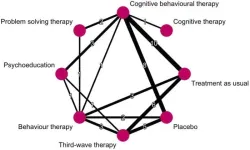Attention-deficit hyperactivity disorder (ADHD) is a well-known neurodevelopmental disorder that affects the brain's ability to regulate attention and control impulses. It poses many challenges to those affected, typically making it difficult for them to sustain focus, follow through with instructions, and maintain a calm and restful state. As one of the most common neurodevelopmental disorders, ADHD impacts individuals throughout their lives, creating a breadth of social, emotional, academic, and workplace challenges.
Despite its high prevalence and decades of research, currently available drugs for ADHD are not able to completely resolve the core symptoms of the disorder in most cases. Today, a type of psychological therapy called cognitive–behavioral therapy (CBT) is widely recommended, either alongside drugs or on its own. This approach involves helping individuals develop practical strategies to manage their symptoms, such as improving organizational skills, enhancing emotional regulation, and reducing impulsive behaviors. While CBT can provide long-term tools for coping with the challenges of ADHD, it is a complex intervention with many different components. Could some components in CBT be consistently more effective than others?
To answer this question, a research team from Japan conducted an extensive review and meta-analysis of existing literature on the subject. The study was conducted by Research Associate Professor Kazuki Matsumoto from Kagoshima University, Assistant Professor Sayo Hamatani from the University of Fukui, Professor Yoshihiko Kunisato from Senshu University, and Associate Professor Yoshifumi Mizuno from the University of Fukui. Their findings were published in Volume 27, Issue 1 in the journal BMJ Mental Health on December 27, 2024.
“To discuss the efficacy of CBT for ADHD, it is important to integrate evidence on the specific effects of CBT components on core symptoms of ADHD and to examine, both theoretically and clinically, whether specific components of CBT are superior to others in the treatment of ADHD,” explain the authors.
First, the team filtered out 18,658 studies on CBT, considering only those that met their inclusion criteria. One important criterion was that all studies had to use a randomized controlled design, meaning that participants were randomly assigned to either a group receiving CBT or a control group (those receiving standard care, no treatment, or placebo). This design provides one of the strongest levels of evidence in clinical research and is the gold standard for evaluating treatment efficacy.
Afterward, the researchers conducted a detailed statistical analysis of the data from 43 trials that met the inclusion criteria. They calculated the components of CBT that were most strongly linked to improvements in ADHD symptoms and patient outcomes using a method of network meta-analysis. Of the many possible techniques used as part of CBT, three stood out as the most effective: organizational strategies, third-wave techniques, and problem-solving techniques.
Organizational techniques include applied behavior analysis, functional analysis, planning, priority training, and environmental adjustments. They seek to help people with ADHD manage tasks by improving planning, prioritization, and organization to reduce distractions and enhance focus. Alternatively, third-wave techniques focus on practices like mindfulness meditation, acceptance and commitment therapy, and dialectical behavior therapy. The goal is to improve emotional regulation and stress management by fostering self-awareness and acceptance. Finally, problem-solving techniques implement training in frameworks and procedures to help patients better deal with real-world practical problems, including interpersonal and financial issues.
The findings of this pioneering study could help guide future research in CBT for ADHD and prompt specialists to reevaluate current clinical practices. “I believe this research will contribute to the development of efficient treatment techniques and the establishment of a therapeutic foundation,” speculates Dr. Matsumoto. “Furthermore, if insurance coverage is approved in Japan, it would significantly improve access to treatment, enabling early intervention and potentially preventing secondary disabilities and enhancing productivity among individuals with ADHD.” Notably, Dr. Hamatani highlights that developing an online therapeutic platform that delivers these identified techniques could be a promising strategy for providing an internet-based intervention program accessible to everyone.
We sure hope this work paves the way for better, more comprehensive treatment strategies for people struggling with ADHD!
***
Reference
DOI: 10.1136/bmjment-2024-301303
About Research Associate Professor Kazuki Matsumoto from University of Kagoshima, Japan
Dr. Kazuki Matsumoto is a specialist in cognitive–behavioral therapy and is well-versed in meta-analysis. He earned his Doctor of Philosophy in Child Development from Osaka University in March 2019. Since 2022, he has been serving as a Lecturer at Kagoshima University. Dr. Matsumoto is dedicated to research on providing cognitive–behavioral therapy for conditions such as obsessive-compulsive disorder, social anxiety disorder, ADHD, and eating disorders through various media.
About Assistant Professor Sayo Hamatani from University of Fukui, Japan
Dr. Sayo Hamatani is an Assistant Professor specializing in internet-based cognitive–behavioral therapy. She earned her PhD in Medicine in 2017. As a recipient of the JSPS Research Fellowships for Young Scientists, she developed a culturally adapted ICBT program at Linköping University, Sweden. Her research focuses on eating disorders and ADHD, using telemedicine to develop treatments through both domestic and international collaborations.
About Professor Yoshihiko Kunisato from Senshu University, Japan
Dr. Yoshihiko Kunisato, PhD, is a professor at the Department of Psychology at Senshu University, where he has been teaching since 2013. He received his PhD in Medicine from Hiroshima University in 2011. His research focuses on clinical psychology, particularly cognitive–behavioral therapy and computational psychiatry. He researches the mechanisms of mental health conditions such as depression and anxiety disorders, combining cognitive–behavioral therapy with computational approaches.
About Associate Professor Yoshifumi Mizuno from University of Fukui, Japan
Dr. Yoshifumi Mizuno, MD, PhD, is an Associate Professor who specializes in MRI-based neuroimaging research on ADHD. From 2019 to 2021, he served as a JSPS Overseas Research Fellow at the Department of Psychiatry and Behavioral Sciences, Stanford University, USA, where he contributed to advancing the understanding of ADHD's neural mechanisms. Currently, Dr. Mizuno leads groundbreaking research as the Principal Investigator of the Division of Affective and Cognitive Development at the Research Center for Child Mental Development, University of Fukui, Japan.
About University of Fukui, Japan
The University of Fukui is a preeminent research institution with robust undergraduate and graduate schools focusing on education, medical and science, engineering, and global and community studies. The university conducts cutting-edge research and strives to nurture human resources capable of contributing to society on the local, national, and global level.
Website: https://www.u-fukui.ac.jp/eng/
Funding information
This work was supported by the Young Researchers Support Program at Kagoshima University, Takeda Science Foundation, Mother and Child Health Foundation (grant number: R04-K2-2), and a Grant-in-Aid for Scientific Research from the Japan Society for the Promotion of Science (JSPS) (grant number: 22H00985).
END





